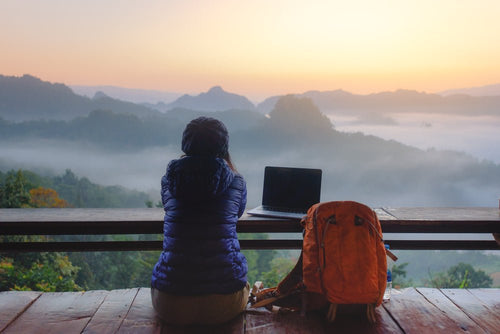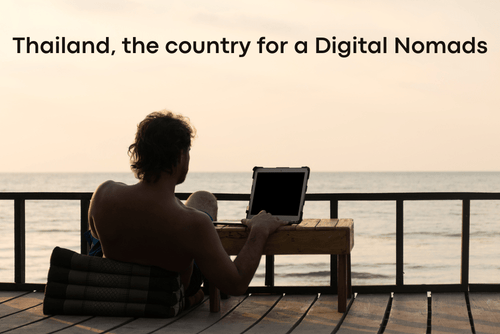Thailand is a popular destination among digital nomads for many reasons. The country is known for its affordable living, remarkable beaches, friendly people, and delicious food. If you're a digital nomad looking to thrive in Thailand, this guide will give you everything you need to know.
What is a Digital Nomad?
Initially, let's define what a digital nomad is. A digital nomad works remotely and is free to travel and work from anywhere in the world. With the rise of technology and the internet, more people are becoming digital nomads, and Thailand is one of the top destinations for this lifestyle.
What makes Thailand a Great Destination for Digital Nomads?
Thailand offers many advantages for digital nomads. Firstly, living costs are relatively low compared to Western countries, so you can stretch your budget further. Additionally, the country has a great infrastructure with reliable internet, co-working spaces, and plenty of cafes with high-speed WIFI. Thailand is also known for its beautiful beaches, lush jungles, and rich culture, making it an attractive place to live and work.
Planning Your Trip to Thailand
If you're a digital nomad planning a trip to Thailand, there are a few things to keep in mind to ensure a smooth, successful, and enjoyable trip. First, consider the time of year you'll be visiting, as Thailand's weather can vary greatly depending on the season. Second, research your accommodation options and choose a location that suits your needs and preferences. Third, ensure you have all necessary vaccinations and travel documents before departing. Finally, familiarise yourself with local customs and laws to avoid misunderstandings or cultural faux pas. With these considerations, you can plan a memorable and productive trip to Thailand as a digital nomad.
Getting a Visa
Before you travel, it's a good idea to sort out your visa. Thailand offers several types of visas, but the most common one for digital nomads is the tourist visa. This visa allows you to stay in Thailand for up to 60 days, and you can extend it for an additional 30 days. If you plan to stay longer, you might consider applying for a different type of visa.
Finding Accommodation
Finding accommodation in Thailand is somewhat easy, and there are plenty of options to choose from. Many digital nomads prefer to stay in co-living or co-working spaces, offering a community of like-minded individuals and a comfortable workspace. Alternatively, you can rent an apartment or a condo, often cheaper than a hotel.
Budgeting for Your Trip
Budgeting for your trip is essential, and Thailand offers a range of options for every budget. You can find affordable street food and budget-friendly accommodation if you're on a tight budget. However, if you want to splurge, Thailand has plenty of luxury options, including five-star hotels and high-end restaurants.
Internet Connectivity
One of the most important aspects of remote working is reliable internet connectivity. Thankfully, Thailand is home to some of the best internet speeds in Southeast Asia. You can expect download speeds of up to 100 Mbps and upload speeds of up to 50 Mbps in most urban areas. However, if you plan on working in more remote areas, it's best to check the internet speed beforehand.
Co-working Spaces
Co-working spaces are an excellent option for digital nomads needing a dedicated workspace outside their hotel or apartment. Thailand has a thriving co-working scene, with spaces available in major cities like Bangkok, Chiang Mai, and Phuket. These spaces often offer high-speed internet, comfortable seating, and a community of like-minded individuals. Some popular co-working spaces in Thailand include Hubba, The Hive, and Punspace. Commonly, Starbucks can be found ubiquitously in every place you visit. Just in case you might want to experience this global franchise coffee shop in Thailand.
Finding Remote Work Opportunities
Thailand is an ideal location for digital nomads looking to work remotely. Many companies are open to hiring remote workers, and there are plenty of opportunities to find work online. Some popular job boards for remote work include Remote.co, FlexJobs, and Upwork. Additionally, networking with other digital nomads and attending meetups can be a great way to find new work opportunities.
Living in Thailand as a digital nomad can be an exciting and rewarding experience. With its breathtaking beaches, rich cultural heritage, and delicious cuisine, it's no wonder that Thailand has become a popular destination for remote workers from all around the world. But, as with any new adventure, there are challenges to overcome and things to consider. Here's your ultimate digital nomad guide to thriving in Thailand.
Living in Thailand
The cost of living in Thailand is moderately low compared to other countries, making it an attractive destination for budget-conscious digital nomads. Accommodations range from basic guesthouses and hostels to luxury apartments and villas. The most popular areas for digital nomads are Bangkok, Chiang Mai, and Phuket.
Renting an apartment or house in Thailand is fairly straightforward, and many options are available. Most apartments come fully furnished, including amenities like gyms and swimming pools. However, it's good to note that some landlords may require a long-term lease or a deposit.
Culture Shock and How to Cope
Culture shock is a common experience for many travellers and digital nomads. Thailand's culture vastly differs from that of Western countries, and adjusting can take some time. Some common sources of culture shock in Thailand include the language barrier, the heat and humidity, and social norms.
It's important to keep an open mind and be patient when coping with culture shock. Learning a few basic phrases in Thai can go a long way in connecting with locals. Joining a group or club can also help you meet new people and adjust to your surroundings. Moreover, Thai people are very kind; they will try their best to understand you and help you through everything.
Meeting Other Digital Nomads
Meeting other digital nomads is a great way to network, share tips and advice on working remotely, and make new friends. There are many meetups and events for digital nomads in Thailand, particularly in Bangkok and Chiang Mai. Joining a co-working space is also a great way to meet other remote workers.
Exploring Thailand's Attractions
Thailand has a wealth of natural and cultural attractions worth exploring. From the beaches of Phuket to the temples of Chiang Mai, there's always something for everyone. However, it's important to respect local customs and traditions when visiting these sites.
Some popular attractions for digital nomads include the Grand Palace in Bangkok, the Doi Suthep Temple in Chiang Mai, and the beaches of Koh Samui. It's also worth exploring the local markets and trying the street food, a highlight of Thai cuisine.
Daily Expenses in Thailand
As mentioned earlier, Thailand's cost of living is comparatively low compared to Western countries. On average, a digital nomad can expect to spend around $1,000 to $1,500 per month, depending on their lifestyle and location. This includes rent, food, transportation, and other expenses.
Food is generally very affordable in Thailand, with street food and local markets offering some of the best deals. Transportation is also relatively cheap, with taxis, tuk-tuks, and motorbikes always available for hire. However, it's crucial to negotiate prices and be aware of scams when using these services.
Health and Safety
As a digital nomad, you can explore new places, meet new people, and experience different cultures. Thailand is a popular destination for remote workers because of its low cost of living, stunning tourist attractions, and rich cultural heritage. However, like any new adventure, there are challenges to overcome, including health and safety concerns.
Thailand is generally a safe and welcoming country, but it's good to be well-prepared and take precautions to ensure your health and safety while abroad. Here are some tips to keep in mind:
- Stay aware of your surroundings: Be mindful of pickpockets and other petty crimes in tourist areas and crowded places. Stay alert when using public transportation, and avoid carrying valuables with you.
- Get vaccinated: Before travelling to Thailand, it's recommended to get vaccinated against hepatitis A and B, typhoid, and rabies. You should also consider getting a flu shot if you travel during the flu season.
- Wear sunscreen: Thailand is known for its hot and humid weather, so protecting your skin from sunburn and skin damage is crucial. Wear sunscreen with a high SPF and reapply it every few hours.
- Stay hydrated: Drink plenty of water to avoid dehydration, especially if you spend time outdoors or engage in physical activities. Avoid drinking tap water and stick to bottled water or filtered water.
Staying Healthy While Abroad
Maintaining your health abroad is important to ensure you can continue working and enjoying every single minute you spend in Thailand. Here are some tips to help you stay healthy:
- Eat healthy: Thailand is known for its delicious dishes, but eating healthy is vital to maintaining energy levels and avoiding illnesses. Look for fresh fruits and vegetables, lean protein, and whole grains. Avoid street food that looks unclean or has been sitting out for too long.
- Exercise regularly: Staying active is essential for your physical and mental health. Many apartments and hotels in Thailand have gyms or swimming pools, or you can join a local gym or yoga studio. You can also go for a jog or a walk in a local park.
- Get enough sleep: Sleeping is the key to your health and productivity. Ensure your accommodation is quiet and comfortable, and avoid working late into the night.
- Seek medical care if needed: If you get sick or injured, seek medical care as soon as possible. Many hospitals and clinics in Thailand offer high-quality care at a fraction of the cost of Western countries.
Avoiding Scams and Dangers
Like any tourist destination, Thailand has its share of scams and dangers. Here are some tips to help you avoid them:
- Research before you go: Research the area you're visiting and familiarise yourself with local customs and laws. Avoid places that are known for scams or criminal activity.
- Use reputable transportation: Use reputable taxi services or ride-hailing apps like Grab to avoid getting scammed by unscrupulous drivers. Avoid using motorbikes unless you're an experienced rider.
- Be cautious with money: Carry only as much cash as you need, and avoid publicly flashing large amounts of money. Use ATMs located in well-lit public places and avoid using them at night.
- Be aware of your alcohol intake: Thailand is known for its nightlife, but drinking responsibly is a must. Don't accept drinks from strangers, and avoid drinking to excess.
Thailand: A Paradise for Digital Nomads
Thailand has a good reputation and is a highly recommended destination for digital nomads seeking a conducive environment to thrive in their work. The country boasts affordable living, reliable infrastructure, and breathtaking scenery, which explains why many people prefer to live and work in Thailand. If you plan to travel to Thailand, ensure that you plan, obtain a valid visa, find suitable accommodation, and budget appropriately. With these tips in mind, you can maximise your time in Thailand and enjoy the digital nomad lifestyle to the fullest.

In summary, Thailand is a remarkable destination for digital nomads seeking a new adventure. While travelling, you must prioritise your safety by adhering to these health and safety tips. Be attentive to your surroundings and take necessary measures to avoid scams and potential dangers. With proper preparation and common sense, you can thrive as a digital nomad and enjoy the unique Thai culture.
Overall, Thailand is an amazing destination for digital nomads who yearn for a productive work-life balance. With reliable internet connectivity, a thriving co-working community, and numerous remote work opportunities, it's no wonder why many digital nomads choose Thailand as their base. Whether you're a seasoned or aspiring digital nomad, Thailand is an ideal place to flourish as a remote worker.










